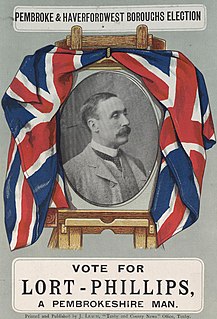John Barlow (died 1718) was a Welsh politician who sat in the House of Commons from 1715 to 1718.
The House of Commons is the elected lower house of the bicameral parliaments of the United Kingdom and Canada and historically was the name of the lower houses of the Kingdom of England, Kingdom of Great Britain, Kingdom of Ireland, Northern Ireland, and Southern Ireland. Roughly equivalent bodies in other countries which were once part of the British Empire include the United States House of Representatives, the Australian House of Representatives, the New Zealand House of Representatives, and India's Lok Sabha.
Barlow was the eldest son of John Barlow of Lawrenny and his wife Dorothy Barlow daughter of Thomas Barlow of Haverfordwest. He married Anne Owen, daughter of Sir Hugh Owen, 2nd Bt MP of Orielton, Pembrokeshire. He succeeded his father in 1701. In 1705 he was High Sheriff of Pembrokeshire. [1]

Lawrenny is a village and parish in the community council ward of Martletwy, in the county of Pembrokeshire, Wales. It is on a peninsula of the Cleddau estuary upriver from Milford Haven where it branches off towards the Cresswell and Carew Rivers and is in the Pembrokeshire Coast National Park.
Sir Hugh Owen, 2nd Baronet (1645–1698) was a Welsh politician who sat in the House of Commons of England at various times between 1676 and 1695.

Orielton is a historic country house near Hundleton in Pembrokeshire, Wales. It is used as a field studies centre for environmental sciences.
In 1715 Barlow stood at a by-election at Haverfordwest and was defeated by a relation, Sir George Barlow of Slebech. However he was then awarded the seat on petition and represented Haverfordwest as Member of Parliament until his death two and a half years later. [1]
Haverfordwest was a parliamentary constituency. It returned one Member of Parliament (MP) to the House of Commons of the Parliament of the United Kingdom, elected by the first past the post system.

Slebech was a community in Pembrokeshire, Wales, which is now part of the combined community of Uzmaston and Boulston and Slebech, a sparsely populated community on the northern shore of the Eastern River Cleddau. The community shares boundaries with the communities of Wiston and Llawhaden and mainly consists of farmland and woodland. Much of the community is within the Pembrokeshire Coast National Park and Picton Castle's stable block loft is an important breeding roost for the rare Greater Horseshoe Bat.
An election petition refers to the procedure for challenging the result of a Parliamentary election.
Barlow died on 30 January 1718. [1] His daughter Anne married Hugh Owen who inherited Lawrenny and changed his name to Barlow.




